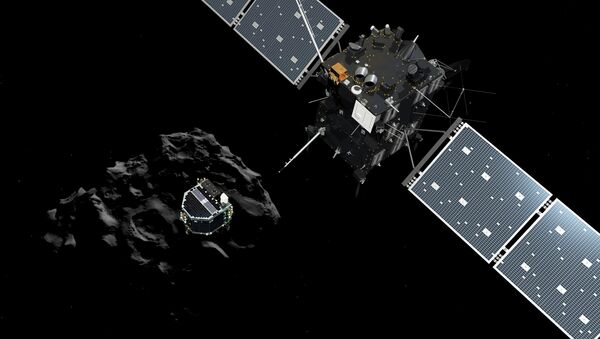MOSCOW, November 18 (Sputnik) – The Philae lander module positioned on the surface of the Churyumov-Gerasimenko comet has discovered hard ice and organic molecules, basic components of life, the German Aerospace Center (DLR) said.
"[The Cometary Sampling and Composition analyzer] COSAC was able to 'sniff' the atmosphere and detect the first organic molecules after landing. Analysis of the spectra and the identification of the molecules are continuing," the DLR said Monday.
"A wealth of data was also obtained with the [Comet Nucleus Sounding Experiment by Radio wave Transmission] CONSERT instrument. During the CONSERT measurements, PHILAE went into hibernation after the power from its primary battery was exhausted," the agency added.
According to the agency, Rosetta Lander Imaging System (ROLIS) of the Philae has taken photographs of the surface at close range, providing scientists with data at two different locations on the comet.
"I'm very confident that Philae will resume contact with us and that we will be able to operate the instruments again," the Lander Project Manager Stephan Ulamec said as quoted by the DLR.
Ulamec stated that technicians at the European Space Operations Centre will be able to communicate with Philae again in the spring 2015, when the comet will have moved to where the sun’s illumination will be able to reach Philae’s solar panels.
The module landed successfully on the city-sized comet on November 12, some 311 million miles from Earth. However, Philae landed in shade, and is currently unable to use solar collection panels that charge batteries powering the onboard systems, going into hibernation on November 15.
The Philae is the lander unit of parent spacecraft Rosetta. Built and launched in 2004 by the European Space Agency, the mission is studying the comet and its nucleus in order to determine whether comets brought water and simple organic molecules to Earth billions of years ago, paving the way for life.

